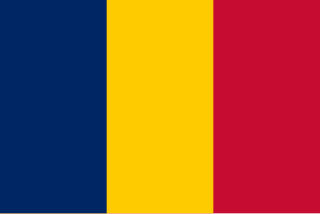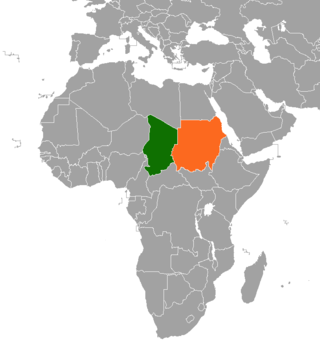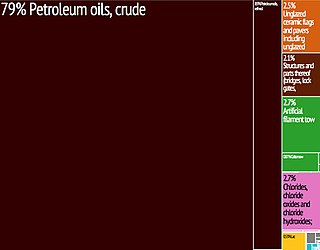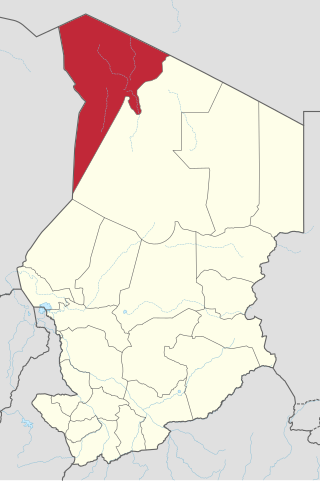| |||||
| Decades: | |||||
|---|---|---|---|---|---|
| See also: | |||||
This article is a list of events in the year 2006 in Chad .
| |||||
| Decades: | |||||
|---|---|---|---|---|---|
| See also: | |||||
This article is a list of events in the year 2006 in Chad .
Chad, officially the Republic of Chad, is a landlocked country in Central Africa. It borders Libya to the north, Sudan to the east, the Central African Republic to the south, Cameroon and Nigeria to the southwest, and Niger to the west. Due to its distance from the sea and its largely desert climate, the country is sometimes referred to as the "Dead Heart of Africa".

Chad, officially the Republic of Chad, is a landlocked country located at the crossroads of North and Central Africa. It is bordered by Libya to the north, Sudan to the east, the Central African Republic to the south, Cameroon to the southwest, Nigeria to the southwest, and Niger to the west. Chad has a population of 16 million, of which 1.6 million live in the capital and largest city of N'Djamena. With a total area of around 1,300,000 km2 (500,000 sq mi), Chad is the fifth-largest country in Africa and the twentieth largest nation by area in the world.

Idriss Déby Itno was a Chadian politician and military officer who was the 6th president of Chad from 1991 until his death in 2021 during the Northern Chad offensive. His term of office of more than 30 years makes him Chad's longest-serving president.

The Chadian Civil War of 2005–2010 began on December 18, 2005. Since its independence from France in 1960, Chad has been swamped by civil wars between the Arab-Muslims of the north and the Sub-Saharan-Christians of the south. As a result, leadership and presidency in Chad drifted back and forth between the Christian southerners and Muslim northerners. When one side was in power, the other side usually started a revolutionary war to counter it.
The Battle of N'Djamena took place between the forces of the revolutionary United Front for Democratic Change (UFCD) and the military of Chad that occurred on 13 April 2006 when rebel forces launched an assault on the capital of Chad in the pre-dawn hours, attempting to overthrow the government of President Idriss Déby Itno from their bases an estimated thousand miles east.
Tama are a non-Arab, African ethnic group of people who live in eastern Chad and western Sudan. They speak Tama, a Nilo-Saharan language. The population is 200,000–300,000 people and they practice Islam. Many Tama are subsistence farmers who live in permanent settlements and some raise livestock. In the civil war in Chad the Tama were involved in ethnic conflicts with the Zaghawa tribe.
Events from the year 2007 in Chad.

The populations of eastern Chad and western Sudan established social and religious ties long before either nation's independence, and these remained strong despite disputes between governments. In recent times, relations have been strained due to the conflict in Darfur and a civil war in Chad, which both governments accuse the other of supporting.
The following details notable events from the year 2008 in Chad. Chad is a landlocked country in Central Africa. It is bordered by Libya to the north, Sudan to the east, the Central African Republic to the south, Cameroon and Nigeria to the southwest, and Niger to the west.
By January 2011 the United Nations High Commissioner for Refugees (UNHCR) estimated that there are 262,900 Sudanese refugees in Chad. The majority of them left Sudan escaping from the violence of the ongoing Darfur crisis, which began in 2003. UNHCR has given the Sudanese refugees shelter in 12 different camps situated along the Chad–Sudan border. The most pressing issues UNHCR has to deal with in the refugee camps in Chad are related to insecurity in the camps,, malnutrition, access to water, HIV and AIDS, and education.

Libyan refugees are people who fled or were expelled from their homes since the beginning of the Libyan Crisis in 2011, including during the First Libyan Civil War, that deposed Muammar Gaddafi in 2011, and the Second Libyan Civil War (2014–2020). Many people have been displaced from Libya to neighbouring Tunisia, Egypt and Chad, as well as to European countries across the Mediterranean. The majority of refugees from Libya are Arabs, though many others are sub-Saharan African migrants who were living in Libya. These groups were also among the first refugee waves to exit the country. The total number of Libyan refugees was estimated at around 1 million in June 2011, with most returning to Libya after the First Civil War ended. In January 2013, there were 5,252 refugees originating from Libya alongside 59,425 internally displaced persons registered by the UNHCR.

An internal conflict in the Central African Republic (CAR) started essentially on 13 April 2013, when the government of President Michel Djotodia officially took over. The fighting was between the government of the Central African Republic's former Séléka coalition of rebel groups, who are mainly from the Muslim minority, and the mainly Christian anti-balaka coalition. The conflict was part of the ongoing Central African Republic Civil War (2012–present). International organisations, such as the United Nations, had warned of a possible genocide. UNSC resolution 2122 authorised the African-led International Support Mission to the Central African Republic (MISCA) to be deployed to the country, and France to lead operations with additional troops sent to bolster its force in the country. Following a summit of Economic Community of Central African States (CEEAC), including the attendance of all the country's MPs, Djotodia resigned from the presidency on 10 January 2014. The National Transitional Council chose Bangui mayor Catherine Samba-Panza as interim president on 20 January 2014. A period of lawlessness prevailed during the early days of her presidency with people moving into religiously cleansed neighbourhoods as the UN warned of a genocide. Anti-Balaka attacks continued against Muslim civilians.
As of 31 August 2020, Cameroon hosted a total refugee population of approximately 421,700. Of these, 280,500 were from the Central African Republic, driven by war and insecurity. In the Far North Region, Cameroon hosts 114,300 Nigerian refugees, with the population sharing their already scarce resources with the refugees.
This article is a list of events in the year 2005 in Chad.

Chad maintains sizable reserves of crude oil which, alongside agriculture, makes up the largest share of the landlocked former French colony's export revenue. Producing around 100,000 barrels of oil a day, most of Chad's crude comes from its reserves in the Doba Basin in southern Chad where oil was discovered in the early 1970s by foreign drillers. There is an estimated one billion barrels of oil in Chad, most of it being exploited by hundreds of rigs operated by Western companies such as ExxonMobil and Shell. However, many challenges exist to Chad's petroleum industry including but not limited to corruption, internal conflict, and geography. Since Chad is landlocked, most of Chad's oil exports are transported out of the country by a pipeline that leads to the Cameroonian port city of Kribi. This pipeline, owned by a consortium, has come under fire due to allegations of exploitation by international corruption watchdogs, and Chadian politicians. In addition, environmentalists have voiced their concerns over the pipeline's impact on the natural environment, citing several spills.

The Northern Chad offensive was a military offensive in Northern Chad, initiated by the Chadian rebel group Front for Change and Concord in Chad (FACT), took place from 11 April to 9 May 2021. It began in the Tibesti Region in the north of the country following the 2021 Chadian presidential election.

In 2016, the Front for Change and Concord in Chad (FACT) and the Military Command Council for the Salvation of the Republic (CCMSR) began a rebellion against the Chadian government. From their rear bases in southern Libya, FACT and CCMSR have launched offensives and raids into Northern Chad seeking to overthrow the government of former president Idriss Déby, who had been in power since a December 1990 coup. Other rebel groups are also involved in the insurgency, though to a lesser extent.
Events in the year 2011 in Chad.
Events in the year 2012 in Chad.
Events in the year 2013 in Chad.